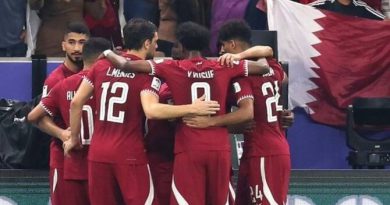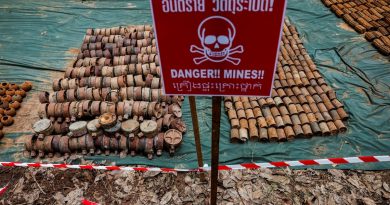India’s Modi to visit White House in June as Biden seeks stronger ties amid competition with China
Washington (AP) — President Joe Biden will host Indian Prime Minister Narendra Modi at the White House next month, courting an Indo-Pacific leader with whom he has sought stronger ties as the United States looks to blunt China’s growing assertiveness in the region.
Modi’s visit June 22 “will affirm the deep and close partnership between the United States and India and the warm bonds of family and friendship that link Americans and Indians together,” White House press secretary Karine Jean-Pierre said Wednesday in announcing the Indian leader’s official state visit.
Biden and Modi will focus on their countries’ commitment to a free and secure Indo-Pacific region, as well as on their technology partnerships, including in defense, clean energy and space, she said. They will also discuss common challenges, including climate change, health security and developing the workforce.
India’s Ministry of External Affairs said the visit will “underscore the growing importance of the strategic partnership between India and the United States”
“This historic visit offers a valuable opportunity for India and the US to further deepen a comprehensive and forward-looking global strategic partnership,” the Indian government said.
U.S.-India relations under Biden have been warm, but also marked by complexity as Biden has sought stronger ties with the world’s largest democracy while at the same time looking to counter China’s growing economic and military assertiveness in the Indo-Pacific region.
Since coming to office, Biden has sought to reinvigorate the Quad, an international partnership with the U.S., Australia, India and Japan. But unlike the other Quad countries and nearly every other major U.S. ally, India has not imposed sanctions on Russia and has offered only limited criticism of its invasion of Ukraine. Russia is India’s biggest supplier of military hardware.
The partnership first formed during the response to the 2004 Indian Ocean tsunami that killed some 230,000 people. Australian Prime Minister Anthony Albanese is set to host Biden, Modi and Japanese Prime Minister Fumio Kishida for a Quad Leaders’ Summit in Sydney later this month.
As Biden worked to unite the world against Russia, India boosted its imports of Russian oil. That allowed India to increase its energy supplies at a discount as its economy struggled to recover from the coronavirus pandemic.
When Modi met with Russian President Vladimir Putin in September, he offered measured public comments about Russia’s actions in Ukraine. “I know that today’s era is not of war,” Modi told Putin.
But Biden has put a premium stronger economic ties with India and other Indo-Pacific nations amid growing competition with China. That’s helped soften the differences between the U.S. and India over Russia.
“So even though, on Russia, Ukraine, and a whole range of other issues around the world, we do have differences in approaches and different views,” said Richard Rossow, senior adviser and chairperson of U.S.-India Policy Studies at the Center for Strategic and International Studies in Washington “On the threat that we both kind of agree is the major emerging threat … for the next generations, there’s very little daylight in our perception there.”
Last year, Biden launched a trade deal with India and 11 other Indo-Pacific nations called the Indo-Pacific Economic Framework. The White House said the agreement would help those economies work more closely on issues including supply chains, digital trade, clean energy, worker protections and anticorruption efforts.
The president is likely to face criticism from human rights advocates for inviting Modi on a state visit and for plans plans to celebrate him at a state dinner, which is a high diplomatic honor reserved for close U.S. allies.
Press freedom in India has declined in recent years and opponents of Modi’s governing Hindu nationalist party have accused it of stifling dissent and introducing divisive policies that discriminate against Muslims and other minorities.
Modi has also been accused of trying to silence critics of his administration’s handling of the pandemic.
India routinely denies criticism of its human rights record. It has also rejected criticism by foreign governments and rights groups that civil liberties have contracted in the country.
Asked about the optics of lavish treatment for Modi, Jean-Pierre said Biden always discusses human rights concerns with his counterparts. She said the U.S.-India relationship is critical.
“This is an important relationship as we speak about the Indo-Pacific, as we talk about how to move forward in that region,” Jean-Pierre told reporters Wednesday during a trip with Biden. “The president believes this is an important relationship that we need to continue and build on.”
Modi had a warm relationship with Biden’s immediate predecessor as president, Republican Donald Trump.
In 2020, weeks before the COVID-19 pandemic forced much of the world into lockdown, Trump made a two-day visit to India that included a raucous rally at a 110,000-seat cricket stadium. Trump had hosted Modi in the U.S. in 2019, a visit that included a side trip to Houston that drew about 50,000 people, many from the large Indian diaspora in the U.S.
Biden last hosted Modi at the White House in September 2021 for a meeting of leaders of the Quad. India also holds the rotating president of the Group of 20 nations and Biden is expected to attend that summit in New Delhi later this year.
Modi is the third foreign leader whom Biden has invited on an official state visit, which includes an expansive arrival ceremony with pomp and pageantry on the White House lawn and a ritzy state dinner with scores of guests from the worlds of politics, business and entertainment. French President Emmanuel Macron visited late last year, followed by South Korean President Yoon Suk Yeol in April.
The last time India was so honored was nearly 15 years ago, under then-President Barack Obama in 2009.



